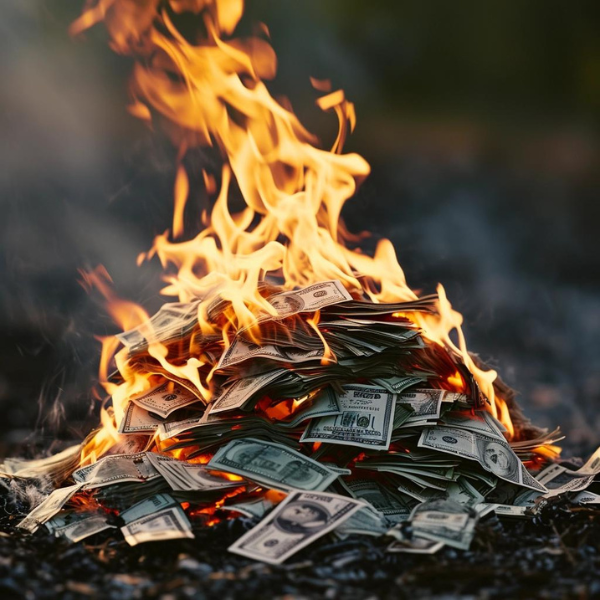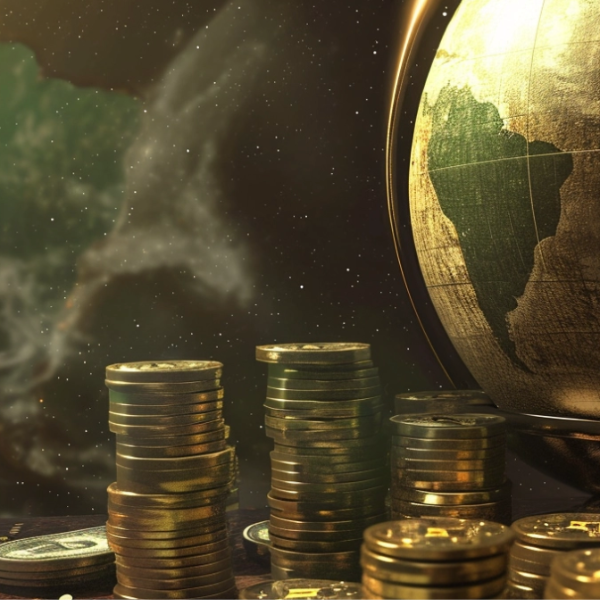Dr. Philipp Bagus – Our debt driven society due to permanent inflation expectation
THE MATTERHORN INTERVIEW – August 2014: Prof. Dr. Philipp Bagus
“Our money system makes people more materialistic”

On behalf of Matterhorn Asset Management, financial journalist Lars Schall interviewed Dr. Philipp Bagus, Professor of economics at Universidad Rey Juan Carlos in Madrid. Bagus points out in this discussion why he thinks the financial crisis is connected to the way money works and addresses the question whether it’s a given that a fiat money system destroys itself in the long run. He says: “The control of our money should be given back to the people. We should be able to choose the medium of exchange that we find most adequate.”
By Lars Schall
Lars Schall: Philipp, thank you for talking to us today and let me first ask you: why do you think the financial crisis is connected to the way money works?
Philipp Bagus: Thank you Lars. The simple answer is that we have fractional reserve banking in a fiat money system. Banks may create money out of thin air and grant credits with it. Credit expansion leads to malinvestments. Entrepreneurs are deceived about the amount of real savings available for investment. They start more investment projects than can be successfully completed with the available savings. They do not start new projects because people have saved more, but just because new money has been created. In addition, the possibility of fiat money creation by central banks to bail out financial institutions has amplified the adverse effects of fractional reserve banking by fostering moral hazard. When the malinvestments become obvious sooner or later, the recession sets in and the errors are corrected. This adjustment period started in 2008 but was torpedoed by central bank and government action.
LS: Why is the money system a rarely discussed topic at universities?
PB: Many economists just focus on symptoms and try to fine tune the obvious problems. They never discuss the monetary system itself. Is our current system the most appropriate for wealth creation; is it a just system; do fractional reserve banking or fiat paper money increase welfare? The explanation of this neglect of fundamental questions may have to do with the main beneficiaries of today´s system which are the banking system and the government. Most professors are employed by the government. They get the pay check from the foremost beneficiary of fiat money. Moreover, most journal articles on monetary policy are written by central bank economists or published in journals financed by central banks. It is not surprising that central bankers do not question their institution but look for more efficient way of monetary central planning.
LS: How is money created and who creates it?
PB: Base money is created by central banks when they purchase assets or grant loans to banks. On top of this, banks can create perfect money substitutes, in the form of demand deposits, holding only fractional reserves.
LS: How does money “work” and what long-term consequences has it on the markets, economy and society? And what is wrong with that in your opinion?
PB: Our immaterial fiat money can produced at virtually no costs. It is produced, by central banks and due to government privilege and in a kind of franchising system also by commercial banks, public and private. The possibility to create money out of thin air is hard to resist. This ensures a constantly increasing money supply and rising prices in the long run. With a price inflation of only 2% per year – a rate at which the ECB would regard price stability as attained – the purchasing power of money falls by half within 20 years.
We can deduce the following consequences from such a fiat money world:
It does not make sense to save in cash anymore and later acquire assets such as houses, as did your ancestors in the 19th century. Rather, it is more advantageous to indebt yourself to purchase a house and pay back the loan later with a money that constantly loses in purchasing power.
In a fiat money world, it makes sense to indebt yourself early in life and acquire assets in order to profit from price inflation. The same is true for companies, leverage becomes more important. Over indebtedness and high leverage are the direct consequences of fiat money. People will not save in cash anymore but invest through intermediaries in assets that rise with price inflation such as stocks. The intermediaries, i.e. financial markets, are, therefore, great beneficiary of fiat money systems. Indeed, financial markets have been growing much faster than the real economy in the last 40 years. The percentage of financial markets of GDP has not stopped growing as did the bankers´ bonuses.
The leverage of companies and banks in a debt ridden economy also means that the economic system becomes more fragile, it becomes unstable. If one debtor goes bust, this leads to losses of its creditors which may be forced into bankruptcy as well and so on. As everyone is loaded with debt and leveraged a default spiral may wipe out many companies. As the system becomes so fragile, it is not in the short run interest of anyone to really change the system. This is maybe the most perverse effect of fiat money.
As everyone gets into debt and everyone invests through financial markets into highly leverage companies or is employed in leveraged companies depending on money creation, or gets income from the government which operations also depend on money creation, no one has the interest to change the system in the short run, because if a commodity money such as a gold standard would be introduced all the overleveraged overindebted schemes would fall apart. There would be mass bankruptcies. There would be a strong one time cleansing effect that would allow for strong and sustainable growth afterwards.
The cleansing effect would reduce the size of financial markets, governments and industries depending on new money creation. A new better monetary system is in the best long run interest of most people. Yet, in the short run, there would be a sudden revelation of losses for many and the unpleasant cleansing.
That is the reason why it is so difficult to change the system.
LS: When it comes to money, are causes and effects often confused?
PB: Economists and the general public have started to define “inflation” as a loss in purchasing power of money, i.e. rising money prices. Yet, until the 20th century inflation was defined as increases in the money supply. To define inflation as rising prices may lead to confuse cause and effect.
Price inflation is just a possible symptom of the underlying cause. It is like having a flue and calling 39 degrees of fever as the cause of the flue. But the fever is just the symptom. The fever is caused by a virus. The same is true with money. When the money supply increases, money prices will be higher than they otherwise would have been. It is the increase in the money supply that causes prices to rise. Rising prices is just one possible symptom of the underlying cause.
Therefore it is better to define the increase in the money supply as inflation. By defining one possible effect of increases in the money supply as inflation the attention is directed toward the symptom and withdrawn from the cause. Therefore, it is in the interest of the people responsible for inflation such as central bankers to shift the focus on rising prices. Actually central bankers portray themselves as fighters of inflation while their main business is actually increasing the money supply.
LS: Does the money system make people more materialistic than need be?
PB: As I explained before, there is a strong pressure in our system to go into debt as early as possible and acquire, with leverage, assets whose values rise with inflation. People do not have the ease to wait and save first anymore to acquire assets. Because if they do and first save for 20 years, the house they want to buy will be much more expensive. As people go early in debt they not only get more dependent on their creditors losing independence, they also start to live with the pressure to earn money to service the debt. They will spend marginally less time for unpaid volunteer work, spiritual activities, sabbaticals, long journey, profound conversations and so on. This is so, because every minute people do not earn money, prices keep increasing. Their behavior would be very different in a world where prices would be slowly and continuously falling as would most likely occur under a natural monetary system such as a gold standard. In such as system you have all the time of the world to buy your house and there is no need to go into debt.
In short, in a fiat money system with continuously increasing prices, paid work gets marginally more important. To earn money quickly and early becomes more important. People lose the ease of saving in cash.
Moreover, they have to become experts on financial markets to invest their savings so that the value of the savings increases at least with the general price level. It is not enough to just put savings aside in cash. As people need more time to invest their savings, they have less time for other activities.
These are the reasons why people get more materialistic in a fiat money system than they are in a natural money system.
LS: Do you think it is a given that a fiat money system destroys itself in the long run? And if so, how can the end be delayed?
PB: In our fiat money system there are – as explained- strong pressure to indebt yourself. Especially those that are to receive the new money first, such as financial markets and governments will take on debts.
As financial markets can be easily be rescued from trouble by the production of new money financial institutions use excessive leverage and engage in risky behavior.
In a fiat money system, financial markets are fragile and governments overindebted. Governments prefer to finance their expenditures through debts rather than unpopular taxes. Also households go into debt. When a crisis arises the pressure for central bank is enormous to save overindebted households, financial markets and governments through additional money production. This is what happened 2007/08. The bailout, in turn, fosters moral hazard and the take on of additional debts.
Indeed, today governments are indebted higher than ever and interest rates lower than ever. Central banks cannot raise interest rates to normal levels without causing the bankruptcy of overindebted agents such as governments, which in turn could trigger a default spiral.
In short, the fiat money system causes overindebtedness, which causes central banks to produce more money, which fosters overindebtedness and moral hazard and more money production. And so on.
These chain of events logically ends in hyperinflation, but there are several options for governments to delay the end. The most important is to reduce the overindebtedness of governments through taxation, capital levies and improve the stability of the banking system through bail-ins. Another more radical option would be a currency reform which reduces debts and savings by, for instance, one/tenth. A currency reform would be a sort of reset of the system. It could then start with its perverse dynamic all over again. All these measure to delay the end imply, of course, a massive redistribution; mainly from savers to debtors , foremost the government.
LS: Who are the biggest beneficiaries of the current monetary system, and why?
PB: Always when new money is produced, the first receivers of the new money benefit to the detriment of the later receivers. The first receivers of the new money, can still buy at the old lower prices. Then prices are starting to go up as the money spreads through the economy. When the later receivers get the new money, prices have already risen. In the meantime, the later receivers have to watch that prices of gasoline, food and energy are rising but their income has not risen yet. So there is an immense redistribution in favor of the privileged early receivers of the new money. The foremost beneficiaries are the money producers themselves, central banks and the commercial banks, public and private.
LS: Why does new created money flow predominantly to certain sectors of the economy, and what are those sectors?
PB: The government sector is one of the early receivers of the newly produced money. The government has the power to tax, to regulate, and to bailout banks. Logically, the banks create new money to finance the government in turn for legal privileges, bailouts and so on.
But there are other sectors that profit. In order to receive a loan of new money, one also has to provide collateral, such as bonds, stocks or real estate. So much of the new money flows to people who can provide such collateral, these are very rich individuals or also established corporations.
The new money is also a shot into the arm for financial markets that have tended to grow enormously over the past 100 years, as it makes sense to invest the new money in more stocks and bonds, that keep rising in value and use them as collateral for additional loans and so on. The intermediaries of these investments, financial markets grow artificially.
LS: You have primarily the state / central banks as your targets; but isn’t it the case that private banks create more money than the state does?
PB: Central banks produce base money by buying assets from the bankings system or providing it with loans. On top of this, the banking system, with public and private banks, can expand credits, i.e. they produce new demand deposits which are perfect money substitute themselves. So you are right, commercial banks can also produce money. Yet, there are many public banks, such as the Cajas en Spain or Sparkassen or Landesbanken in Germany. By the way, those that invested most wrecklessly in the financial crisis.
Moreover, banks have received the legal privilege from the state to hold fractional reserve. Legal principles require to hold 100% reserves for demand deposits, and this holds true for private persons today. If I deposit money with you, you have to to hold 100% reserves, you have to hold the money always available for me. Except you have a banking license. It is a legal privilege.
Banks also can rely of being bailed out by the government if they are big enough. Profits are privatized, losses are socialized. And are banks really private today? Private in which sense? Banks hold many government bonds and the government implicitly guarantees for them. We may just think of the banking system as part of the government sector. The banking system could not create money if it would not be for governments granting them these privileges.
LS: What do you propose should replace the existing system?
PB: A free market system. The control of our money should be given back to the people. We should be able to choose the medium of exchange that we find most adequate. Money with gold or silver content would be such a free market alternative. There should be no privileges anymore, which implies also 100% reserves for banks.
LS: Where should the impetus come from to do this?
The impetus must come from civil society. When people start to understand the perverse consequence of today’s monetary system such as financial crises, social and moral decay, as well as redistribution in favor financial markets, the super rich and government, they may revolt. For that reason I have written with Andreas Marquart “Warum andere auf Ihre Kosten immer reicher werden.” The book explains the problems in a language accessible to everyone. When people start to understand there is hope. Especially, after the next financial crises or crash, there may be a chance for change.
LS: Do you foresee currency reforms? A reset of the international monetary system?
PB: A currency reform would be an option to smoothly, without a crash or hyperinflation reset the monetary system. Such a reform could involve the reduction of monetary debts and savings by decree and a confiscation of any profits resulting from the reform. Something similar has been done in Germany after World War II. Such a reform could also involve the centralization of fiat money production in order to improve confidence in the system.
LS: Will gold make a comeback into the monetary sphere?
PB: It is a possibility. When confidence in fiat currencies collapses or is about to collapse, governments may want to play the gold card to restore confidence into their currencies and prevent a crash or hyperinflation. Gold currencies may also make a comeback through private initiative, especially, when price inflation starts to soar.
LS: You teach at a university in Spain. Please tell us about your observations related to Spain’s crisis in lieu of what we’ve talked about in this interview?
PB: In Spain we had several bubbles caused by credit expansion made possible by the extremely loose monetary policy of the ECB in the early 2K’s. We had a real estate bubble, with up to 80,000 housing units built per year, more than in France and Germany together. Consequence was a bubble in the banking sector. The banks that financed the real estate bubble made huge profits and expanded. There was a bank branch at every corner in Madrid. Also government revenues increased which was made possible by the profits in the real estate sector and banking sector. Government spending, mostly social spending, skyrocketed. A government bubble was born financed by easy money.
The first bubble that burst was the real estate bubble, the banking bubble is still bursting with banks artificially financed by the ECB or propped up by tax payers´ money. The last bubble still intact is the government bubble. Politicians decline to prick it. They do not reduce government spending even though their tax revenues have collapsed after the end of the real estate boom. Rather Spanish politicians increase taxes or finance their expenditure by incurring in new debts made possible by the accommodative policy of the ECB and the implicit backing of German tax payers for the Eurozone debts. It is easy to see that this situation is not sustainable.
LS: One final question: How do you prepare personally for a deteriorating financial environment?
PB: I try to hold part of my assets in a form that is not easily taxed or confiscated by governments. I also think that investing in your or your children´s education is a good way to prevent losses and escape government confiscation schemes.
Dr. Philipp Bagus is from German origin and Professor of economics at Universidad Rey Juan Carlos in Madrid, Spain. He focusses in his work on the theory of money and the business cycle. His articles gets published, inter alia, in the Journal of Business Ethics, Independent Review, American Journal of Economics and Sociology. Together with Andreas Marquart he wrote the book “Warum Andere auf Ihre Kosten immer reicher werden …und welche Rolle der Staat und unser Papiergeld dabei spielen“ (“Why others get richer at your expense… and what role the state and our paper money plays in it”). Furthermore, Dr. Bagus wrote “Tragedy of the Euro” (free pdf download & recommended reading).
About Edward Maas
Edward Maas
VON GREYERZ AG
Zurich, Switzerland
Phone: +41 44 213 62 45
VON GREYERZ AG global client base strategically stores an important part of their wealth in Switzerland in physical gold and silver outside the banking system. VON GREYERZ is pleased to deliver a unique and exceptional service to our highly esteemed wealth preservation clientele in over 90 countries.
VONGREYERZ.gold
Contact Us
Articles may be republished if full credits are given with a link to VONGREYERZ.GOLD



